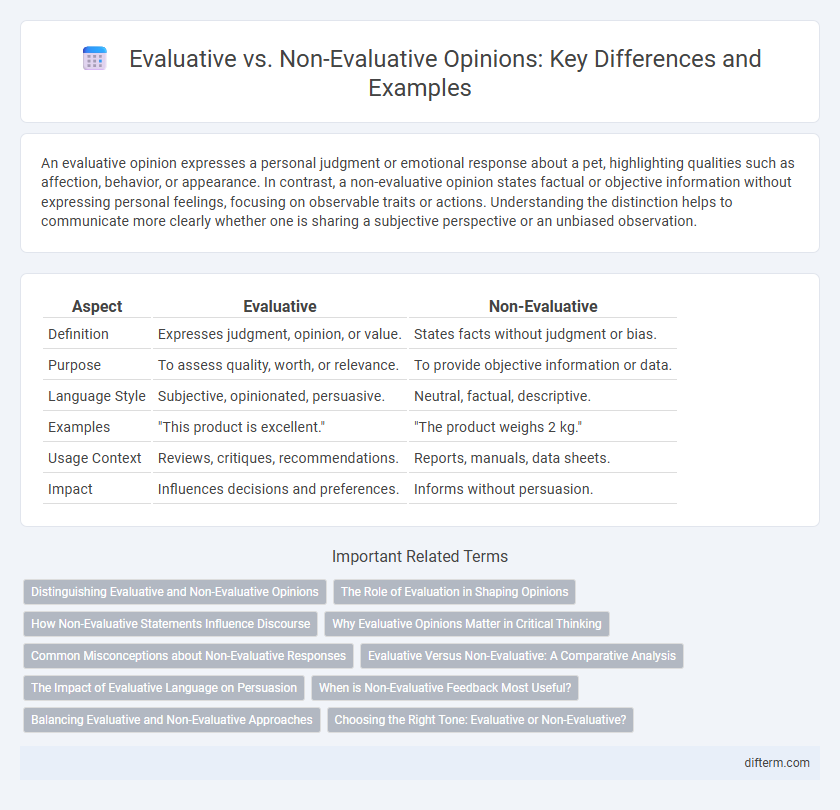An evaluative opinion expresses a personal judgment or emotional response about a pet, highlighting qualities such as affection, behavior, or appearance. In contrast, a non-evaluative opinion states factual or objective information without expressing personal feelings, focusing on observable traits or actions. Understanding the distinction helps to communicate more clearly whether one is sharing a subjective perspective or an unbiased observation.
Table of Comparison
| Aspect | Evaluative | Non-Evaluative |
|---|---|---|
| Definition | Expresses judgment, opinion, or value. | States facts without judgment or bias. |
| Purpose | To assess quality, worth, or relevance. | To provide objective information or data. |
| Language Style | Subjective, opinionated, persuasive. | Neutral, factual, descriptive. |
| Examples | "This product is excellent." | "The product weighs 2 kg." |
| Usage Context | Reviews, critiques, recommendations. | Reports, manuals, data sheets. |
| Impact | Influences decisions and preferences. | Informs without persuasion. |
Distinguishing Evaluative and Non-Evaluative Opinions
Evaluative opinions express a judgment or value assessment, often reflecting personal preferences or criteria, whereas non-evaluative opinions provide factual observations without appraisal or bias. Distinguishing between these types hinges on identifying language that signals approval, disapproval, or comparison versus neutral descriptions or statements of fact. Recognizing this difference enhances critical thinking by clarifying when an opinion is subjective or objective in nature.
The Role of Evaluation in Shaping Opinions
Evaluation plays a critical role in shaping opinions by determining how individuals assess information based on personal values, experiences, and criteria. Evaluative judgments involve subjective interpretation, which influences emotional responses and decision-making processes, thereby distinguishing opinions from purely factual beliefs. Non-evaluative statements, in contrast, provide neutral descriptions without imparting judgment, limiting their impact on opinion formation.
How Non-Evaluative Statements Influence Discourse
Non-evaluative statements shape discourse by presenting information objectively without expressing judgment or bias, fostering open and inclusive communication. These statements facilitate clearer understanding and reduce conflict by focusing on facts and observable data rather than subjective opinions. Their influence promotes balanced discussions where diverse perspectives are acknowledged without immediate critique or endorsement.
Why Evaluative Opinions Matter in Critical Thinking
Evaluative opinions matter in critical thinking because they involve judgment based on criteria, which drives deeper analysis and reflection. Unlike non-evaluative statements that merely describe, evaluative opinions encourage assessing the value, quality, or significance of information. This evaluative process sharpens decision-making skills and fosters more nuanced understanding.
Common Misconceptions about Non-Evaluative Responses
Non-evaluative responses are often misunderstood as being neutral or devoid of judgment, yet they can convey subtle emotional cues and implicit attitudes. Many believe non-evaluative statements lack personal bias, ignoring how word choice and tone still shape meaning and influence perception. Recognizing this nuance is essential to accurately interpret communication beyond the simple evaluative versus non-evaluative dichotomy.
Evaluative Versus Non-Evaluative: A Comparative Analysis
Evaluative language conveys judgments and subjective interpretations, influencing readers' perceptions by emphasizing positive or negative qualities. Non-evaluative language, in contrast, presents information factually without bias, allowing readers to form independent opinions. Analyzing these approaches reveals how evaluative expressions engage emotions and guide attitudes, while non-evaluative discourse prioritizes objectivity and neutrality.
The Impact of Evaluative Language on Persuasion
Evaluative language significantly increases persuasive impact by framing information with subjective judgments that influence readers' attitudes and emotions. Studies show that messages containing evaluative terms, such as "excellent" or "poor," enhance audience engagement and motivation to act compared to neutral descriptions. Incorporating evaluative language strategically can therefore strengthen argument effectiveness and drive desired responses in communication.
When is Non-Evaluative Feedback Most Useful?
Non-evaluative feedback is most useful during the early stages of learning or skill development when individuals benefit from specific, descriptive information rather than judgmental assessments. It fosters a growth mindset by highlighting areas for improvement without triggering defensiveness or discouragement. This approach enhances motivation and facilitates self-reflection, leading to more effective and sustained progress.
Balancing Evaluative and Non-Evaluative Approaches
Balancing evaluative and non-evaluative approaches enhances objectivity and depth in opinion expression, combining subjective judgment with factual observation. Evaluative language conveys personal attitudes and critical assessments, while non-evaluative terms provide neutral, descriptive information that anchors opinions in reality. Integrating both methods fosters nuanced perspectives, enabling clearer communication and informed decision-making.
Choosing the Right Tone: Evaluative or Non-Evaluative?
Choosing the right tone between evaluative and non-evaluative writing hinges on the purpose and audience of the text. Evaluative tones provide critical judgment and subjective insight, often essential in reviews or opinion pieces where personal stance matters. Non-evaluative tones prioritize objective presentation of facts, ideal for informative contexts requiring neutrality and clarity.
evaluative vs non-evaluative Infographic

 difterm.com
difterm.com